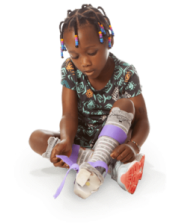What is a cerebral palsy developmental delay?
 A cerebral palsy developmental delay happens when a child takes longer than expected to reach milestones like rolling over, grasping objects, or babbling.
A cerebral palsy developmental delay happens when a child takes longer than expected to reach milestones like rolling over, grasping objects, or babbling.
While every child grows at their own pace, consistent delays in movement or speech could be an early sign of cerebral palsy.
This is because CP impacts the brain’s ability to control muscle movements and coordination.
The difference between cerebral palsy and developmental delay is that CP is permanent, while other delays may improve over time.
Identifying cerebral palsy developmental delays early can help ensure your child gets the care they need. If you’re concerned about missed milestones, talk to your child's doctor to understand potential causes and next steps.
If you believe your baby was harmed by a preventable injury during childbirth, you may have legal options. A cerebral palsy lawsuit could help secure the compensation your family needs for your child’s care and support.
Cerebral Palsy Guide works with a network of top CP lawyers across the country. Our legal partners have recovered over $1 billion for families affected by preventable birth injuries, like cerebral palsy. We may be able to help your family, too.
Find out if you could be eligible for financial compensation now with a free case review.
How to know if a baby has cerebral palsy
Every child develops at their own pace, but regularly missing key milestones may signal an underlying neurological or movement disorder, like cerebral palsy.
Some children may face delays in physical abilities, while others may take longer to develop socially or emotionally. Physical developmental delays are often one of the first signs of CP.
Understanding what is typical can help parents spot potential issues and act quickly.
Cerebral palsy developmental delay in newborns (0-3 months)
In the first few months of life, early signs of cerebral palsy in newborn babies may show up in their ability to develop muscle control and motor skills.
- Delays in developing neck strength
- Favoring one side of the body when reaching or turning
- Lack of reflexes, like the startle reflex
- May appear unusually floppy or stiff
If your baby shows signs of a cerebral palsy developmental delay, talk to their pediatrician. Early diagnosis and intervention can improve long-term outcomes and support healthy development.
Early signs of cerebral palsy in babies (3-9 months)
Cerebral palsy developmental delays may become clearer between 3 and 9 months as babies begin — or fail — to meet expected developmental milestones.
By 6 months old, babies typically develop head control, reach for objects, and interact with their surroundings. A cerebral palsy 6-month-old may struggle with these milestones.
- Delayed or absent responses to sounds or visual cues
- Difficulty holding their head up
- Limited or uneven movement on one side of the body
- Stiff muscles (spasticity) or floppy limbs
- Trouble rolling over or sitting up without support
- Using only one hand while keeping the other fisted
If your baby is showing signs like these, consult a cerebral palsy specialist to understand any possible developmental disabilities better.
Delays to watch for in toddlers (1-3 years)
Cerebral palsy developmental delays may become more noticeable in early childhood as kids begin to explore their surroundings and develop motor skills.
If your child is not meeting milestones, it could mean they have an underlying condition, like a type of cerebral palsy.
- Difficulty standing or pulling up to stand without support
- Dragging one side of the body while crawling or not crawling at all
- Falling frequently and other problems with balance
- Having difficulty forming simple words like "mama" or "dada"
- Keeping a hand fisted or not reaching for objects
- Walking difficulties, like walking on toes or not walking on their own
If you are concerned that your child is missing milestones, you probably have a lot of questions.
Cerebral Palsy Guide has a team of registered nurses on staff who understand and are here to help.
“My niece, Cameron, has cerebral palsy. Her childhood was difficult, with many obstacles her mother didn’t expect and wasn't sure how to navigate. She makes me want to help others affected by CP have the opportunities she's had.”
— Kristin Proctor, Cerebral Palsy Guide Registered Nurse
Our labor and delivery nurses have decades of experience helping families like yours.
Connect with a caring nurse right now — free of charge.
Causes of cerebral palsy developmental delays
Cerebral palsy developmental delays are usually caused by damage to the developing brain, often before, during, or shortly after childbirth.
While some cases result from unavoidable complications, others stem from preventable errors during labor and delivery, known as medical malpractice.
Learn more about what causes cerebral palsy developmental delays below.
Brain injuries
Trauma to the brain is a leading cause of cerebral palsy developmental delays. Injuries like oxygen deprivation (which can cause hypoxic-ischemic encephalopathy or HIE), traumatic delivery, or untreated infections can severely impact a newborn's brain.
- Delaying a necessary cesarean section (C-section)
- Failing to diagnose and treat maternal infection
- Ignoring heart rate abnormalities and signs of fetal distress
- Misusing delivery tools like forceps or vacuum extractors
If you believe your child’s brain injury could have been avoided, taking legal action might allow your family to access cerebral palsy financial assistance.
Birth complications
Birth complications like perinatal asphyxia (lack of oxygen during delivery), umbilical cord issues, or prolonged labor can also cause cerebral palsy developmental delays.
In some cases, these complications occur naturally, but they can often be managed or avoided with proper medical care.
When doctors fail to act quickly in emergencies or make mistakes during delivery, the resulting harm to babies can have lifelong consequences.
For example, missing signs of maternal infections could lead to preventable brain damage.
If you suspect your child’s cerebral palsy resulted from medical malpractice during childbirth, you may be entitled to financial compensation.
Get a free case review right now to see if you may be able to take legal action.
Key milestones affected by cerebral palsy
Cerebral palsy developmental delays can impact a child’s ability to reach milestones in several areas, including motor skills, speech and language, and cognitive and social growth.
Learn more about how CP affects these milestones below.
Motor skill delays
These cerebral palsy developmental delays are often the most noticeable. Motor function delays occur because CP affects muscle tone, coordination, and movement.
Children with CP may have trouble performing physical tasks that are typically expected for their age.
- Difficulty rolling over, sitting, or crawling
- Mobility limitations, like trouble walking or a scissored gait
- Problems with daily tasks, like buttoning clothing
- Trouble holding objects, like toys or utensils
If your child shows continual gross motor impairments, it’s important to consult a doctor to determine whether cerebral palsy could be the underlying cause.
Speech and language delays
These are common cerebral palsy developmental delays, as the condition may impact the muscles used for speaking or swallowing.
Communication challenges may range from mild speech delays to severe difficulty expressing needs and understanding others.
- Challenges understanding instructions
- Difficulty babbling or forming simple words
- Limited vocabulary compared to peers
- Trouble forming clear sounds or sentences
Early intervention, like speech therapy, can improve communication skills and help children with CP express themselves better.
Cognitive and social development
Cerebral palsy may affect cognitive and social milestones, though not all children with CP experience intellectual disabilities. Delays in these areas can impact a child’s ability to learn, interact, and build relationships.
- Delayed understanding of social cues and interactions
- Difficulty solving simple problems or learning new skills
- Limited emotional regulation or coping skills
- Trouble building relationships with peers
Early support from developmental specialists, along with tailored special education, can help children with CP overcome these challenges and thrive.
What to do if your child is developing slowly
Waiting for a diagnosis can be overwhelming, but there are meaningful ways to support your child’s development during this time.
Taking proactive steps can help encourage healthy growth and make a big difference in your child’s progress.
Here are 3 tips from our own registered nurse, Katie Lavender:
- Encourage purposeful play: Use activities like stacking blocks or squeezing Play-Doh to build motor skills and coordination.
- Promote social interaction: Limit screen time and engage in face-to-face play to support emotional and social growth.
- Read every day: Reading aloud helps develop language skills and introduces new vocabulary.
While waiting for a diagnosis, focus on creating opportunities for learning and connection.
These activities not only support your child’s development but also provide valuable moments for bonding. If you have concerns, reach out to your pediatrician or a developmental specialist.
Diagnosing cerebral palsy developmental delay
Catching signs of cerebral palsy developmental delays can lead to an early CP diagnosis. Parents who suspect their child has a developmental motor disorder should see a doctor as soon as possible.
The earlier CP is diagnosed, the faster treatment can begin — which increases the likelihood of improving your child’s long-term quality of life.
- Empathetic and compassionate
- Experienced in diagnosing cerebral palsy
- Familiar with specialists in other fields
- Willing to build a relationship with families
The American Academy of Pediatrics recommends that children receive developmental screenings at their 9-, 18-, and 30-month check-ups.
If your child is showing signs of abnormal development, developmental screenings may need to become more frequent. Children who are screened for potential CP often see other specialists, like a neurologist.
Diagnosing cerebral palsy can be a long and frustrating process for parents. Finding a pediatric specialist that you can trust is one of the first steps toward receiving a proper diagnosis and treatment.
Treatment options for cerebral palsy developmental delays
The goal of cerebral palsy treatment is to support your child’s growth and improve their quality of life through specialized interventions.
- Assistive devices like braces or wheelchairs for mobility
- Early intervention programs to address delays in children under 3
- Physical therapy to improve strength and coordination
- Speech therapy to assist with communication challenges
- Occupational therapy to enhance daily skills like eating and dressing
The Centers for Disease Control and Prevention estimates that lifetime care for a child with cerebral palsy can exceed $1.5 million.
Most families are not prepared for this unexpected financial burden and may struggle to pay for CP treatment.
If medical negligence played a role in your child’s condition, pursuing a cerebral palsy lawsuit settlement could help secure money for long-term care.
Get cerebral palsy legal help
If your child’s cerebral palsy developmental delay was caused by a medical error, compensation from a lawsuit can help cover the cost of treatment, therapy, and specialized care.
An experienced cerebral palsy lawyer can help determine whether your child’s cerebral palsy was preventable and guide you through the legal process.
Our legal partners have secured over $1 billion for families just like yours. We may be able to help your family, too.
Call us right now at (855) 220-1101 or get a free case review to find out if you could be eligible for financial compensation.





